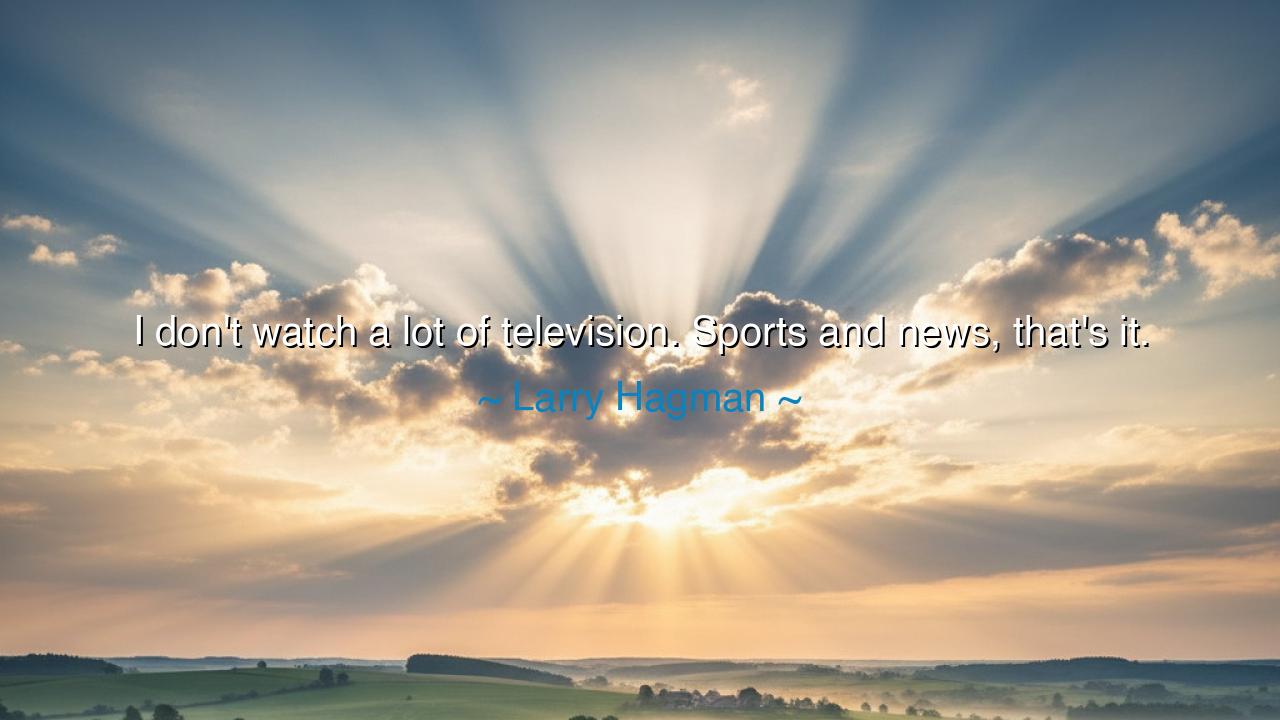
I don't watch a lot of television. Sports and news, that's it.






In the age of endless distractions, when the mind is constantly bombarded by the noise of modern life, there are those who understand the power of restraint and focus. Larry Hagman, the celebrated actor known for his roles in Dallas and I Dream of Jeannie, offers us a glimpse into this wisdom when he says, "I don't watch a lot of television. Sports and news, that's it." These words reveal a philosophy that values the importance of purposeful consumption of information and entertainment. Hagman’s approach is one that recognizes the importance of clarity and focus in a world that often seeks to overwhelm us with unnecessary stimuli.
In the ancient world, such a philosophy was not only understood but revered. The Greek philosophers, particularly Socrates and Plato, often spoke of the need for intellectual discipline and the pursuit of wisdom through careful study and reflection. Socrates famously said, “An unexamined life is not worth living, yet he was also keenly aware of the dangers of excessive distraction. His life was dedicated to dialogue, to the pursuit of truth and virtue, rather than the pursuit of empty pleasures or unnecessary noise. Hagman’s preference for sports and news, then, mirrors this ancient commitment to focus—he seeks knowledge and engagement in a world that offers many options, but he chooses only what he deems essential to his life and growth. In the same way, the philosophers chose dialogue and reflection over the distractions of their time.
In the ancient Roman world, Cicero, the statesman and orator, believed that time spent on frivolous activities was time wasted. He valued education, intellectual pursuits, and reflection over indulgence. Like Hagman, who distills his consumption to what is meaningful, Cicero understood that true wisdom is found in intentionality, not in mindless engagement. His life was one of rigorous discipline, where every action, every conversation, had purpose. In a world filled with distractions—whether they be entertainment, gossip, or idle talk—both Cicero and Hagman understood the power of choosing what to focus on. News and sports, to them, were tangible ways of engaging with the world, but without falling into the trap of excess or unneeded distraction.
Hagman’s choice to focus on sports and news also speaks to a deeper connection with the rhythms of life— particularly the human need for balance. In ancient Sparta, the warriors were trained in mind and body, their lives dedicated to the art of war and the wisdom of leadership. They spent their time in both rigorous training and strategic thinking. They were not idle in their pursuits, but they understood that strength and knowledge came from a disciplined engagement with the world, not from mindless indulgence. Hagman’s focused approach to television mirrors this Spartan ideal—he chooses to engage with the world through channels that inform and invigorate him, not with the entertainment that distracts from deeper pursuits.
The sports and news that Hagman mentions in his quote also represent a connection to the broader world of human endeavor. The ancient Greeks, in particular, celebrated athletic competition as a vital expression of both physical and moral excellence. The Olympic Games were not just about sports—they were about bringing people together to showcase their strength, resilience, and honor. For Hagman, sports likely represent a celebration of human achievement, the kind of focused, disciplined endeavor that can inspire and engage without overwhelming the spirit. News, on the other hand, is the tool through which we stay connected to the larger world, to the movements and events that shape our times. It is through these two pursuits that Hagman engages with the world—not through mindless entertainment, but through the reflection of action (in sports) and the reflection of current events (in news).
The lesson here is one of intentionality and discernment. In our own lives, we are constantly surrounded by the pull of distractions. We live in a time when our attention is fragmented by a thousand different sources, each vying for a moment of our focus. Hagman’s choice to limit his engagement to only what truly matters—sports and news—reminds us of the power of restraint. Rather than fill our minds with everything that comes our way, we must be discerning, choosing only what enriches us and serves our purpose. Just as Socrates, Plato, and Cicero understood the value of focus in the pursuit of wisdom, so too must we recognize the value of intentional engagement in our own lives.
So, let us take this wisdom into our daily practice. Let us choose what we consume with care, focusing on what enhances our understanding, connection, and personal growth. We must avoid the noise that dulls our senses and instead seek out the knowledge, experiences, and actions that resonate with our deepest values. By doing so, we can ensure that our lives are not spent in idle distraction, but in meaningful engagement, just as the greatest thinkers, philosophers, and warriors of the past chose their focus with wisdom.






AAdministratorAdministrator
Welcome, honored guests. Please leave a comment, we will respond soon